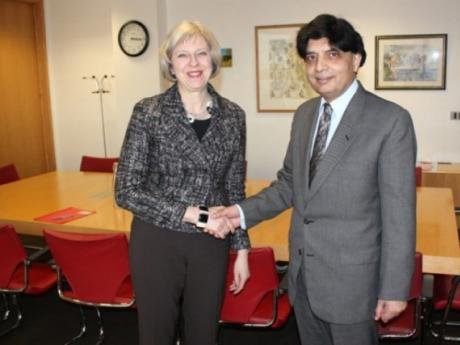
‘Deputy Crown Prince Expresses Satisfaction over His Meetings with British Senior Officials’ London Feb2015 (Saudi Press Agency)
Dear Home Secretary,
I understand that, like me, you personally oppose the death penalty. You may have seen that a majority of British voters now share this position, and that public support for capital punishment has fallen to its lowest level since records began.
Your rejection of capital punishment is of course consistent with the stance of the Government in which you serve, which has a “five year strategy” to abolish the death penalty worldwide.
I am writing to ask how you reconcile this position with your Department’s active support for thousands of death sentences overseas; many of which have been handed down to women and children who faced sham trials in kangaroo courts.
Under your tenure as Secretary of State, the Home Office has been Europe’s most generous funder of aggressive anti-drug raids in countries which send non-violent drug offenders to death row. These raids have seen thousands of drug mules sentenced to death and executed.
British counter-narcotics support, which the Home Office oversees as the Department responsible for “international drug policy”, has led to around 3,000 executions in Iran and 112 death sentences in Pakistan. And as the Observer reported last week, it may also be linked to an untold number of beheadings in Saudi Arabia.
Reprieve’s investigations show your Department has given at least £20 million in taxpayers’ money to anti-drug raids in these countries. This funding has covered elite training for drug police, intelligence sharing exercises, provision of patrol vehicles, drug testing kits, and sniffer dogs, and even the establishment of border posts where drug mules face summary execution.
The organisations receiving this generous support proudly acknowledge their pursuit of the death penalty for those they apprehend. Pakistan’s Anti-Narcotics Force, for example, describes capital convictions as “prosecution achievements”, and stated in its last annual report that its number one priority was “bringing culprits to the task through effective prosecution”.

Theresa May receiving Pakistani Interior Minister Chaudhry Nisar in February 2015, just before Pakistan revealed execution plan
This barely disguised bloodlust is actively encouraged by targets attached to Home Office-funded aid programmes. “Performance indicators” for such projects call for anti-drug agencies to demonstrate increased arrests, higher conviction rates, and larger seizure sizes – all of which incentivise death sentences under judicial systems where certain seizure sizes make drug charges “death eligible”.
Your Government has already accepted that such contributions do indeed encourage the use of the death penalty, and recently ceased aid to Iran after agreeing with an assessment made by Denmark that “the donations are leading to executions”.
Despite this, your Department has refused to withdraw similar aid to Pakistan, and has given a series of increasingly flaccid excuses for maintaining its deadly donations even as the country has expanded its execution campaign.
First, the UK said its support would continue while Pakistan had a death penalty moratorium in place. Then this moratorium was rescinded. Next, the UK pointed out that Pakistan planned to execute only terrorists. Pakistan then announced it wanted to kill everyone on death row. Your revised position is not yet certain; I have written to you privately asking for clarity, but have not received a response.
112 drug offenders currently await the gallows in Pakistan. Astonishingly, this group includes at least 2 British citizens whose identity remains unknown to the British Government.
It is unlikely that any of these individuals will escape the hangman’s attention for long. In recent months Pakistan has progressively widened the scope of its execution campaign, moving on from alleged terrorists to those convicted of offences such as manslaughter. In recent weeks the rate of executions has also increased by a rough factor of ten.
Reprieve believes this situation necessitates an urgent reassessment of the UK’s continued counter-narcotics aid, which currently puts your Department at risk of complicity in a wave of drug-related executions.
The British Government does have a policy which should guard against complicity in grave human rights abuses such as the death penalty; unfortunately, the obscurely-named “Overseas Security and Justice Assistance” Guidance falls sorely short of achieving this.
Instead, the Guidance, which covers all Departments of Government and is intended as the first, last and only line of defence protecting British taxpayers from complicity in human rights abuses, is in fact little more than a checklist for civil servants to fill in and file away in an opaque FOI-proof folder.
Initially conceived in the aftermath of 2011’s Arab revolutions, which saw embarrassing revelations emerge about the Blair Government’s links to security forces in Libya Bahrain and Yemen, the OSJA was intended to make policymakers think twice before entering into unsavoury “strategic partnerships” which would leave the UK complicit in grave abuses.
Unfortunately, the Guidance has turned out to be a toothless document. Its most serious safeguard, to be employed when there is a serious risk a project will enable human rights abuses and no realistic prospect of mitigating that risk, is that Ministerial approval must be sought. The guidance might as well read “CAUTION: In case of human rights emergency, seek email OK from Parliamentary Under-Secretary”.
In the face of such flimflam, one might expect transparency to provide an additional check. After all, when first announcing the publication of the Guidance in 2011 William Hague argued it would prove “the Government is committed to tackling issues relating to security and human rights in a transparent way”. Surely public scrutiny of these OSJA “assessments” would help hold Ministers to account?
Appallingly, as you will know well, the opposite is true. The OSJA assessment process is shrouded in secrecy; your own Department has repeatedly tried to exploit loopholes in the Freedom of Information Act to keep these assessments secret, notably citing one exemption which allows you to classify documents if they might embarrass another state.
In an assault on accountability that would satisfy only Kafka and Colonel Ghaddafi, you have sought to keep even innocuous documents secret on the grounds their publication might imply other more insulting documents exist.
As a result of the Government’s stonewalling, no satisfactory explanation has been given as to how the Home Office intends to avoid complicity in more than a hundred executions of prisoners on Pakistan’s death row; or prevent similar situations arising in the future. Reprieve believes the British public are owed an explanation as to the gaping chasm between the Home Office’s words and deeds when it comes to human rights.
The British Government is opposed to the death penalty “in all circumstances”, and the application of this principle cannot end at the water’s edge. It has become abundantly clear that British counternarcotics aid is sending drug mules to death row, and the Home Office’s refusal to be open and transparent – or even meaningfully address this issue – makes them doubly culpable. The current situation undermines the UK’s reputation as a human rights defender and works against stated foreign policy goals.
Reprieve believes there is only one way to resolve this situation in favour of justice and human rights: make British counter-narcotics assistance strictly conditional on recipient states abolishing the death penalty for drug offences, and when this condition is not satisfied, redirect aid toward drug programmes which prioritise health and harm reduction.
I sincerely hope that the gravely deteriorating situation in Pakistan will lead you to reassess British support which sends drug mules to death row, and that action is taken swiftly and urgently. A hundred lives would be a heavy toll to pay for the Home Office’s failed approach.
Yours Sincerely,
Maya Foa
Director, Death Penalty Team, Reprieve
Read more
Get our weekly email



Comments
We encourage anyone to comment, please consult the oD commenting guidelines if you have any questions.